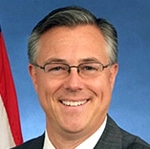
After nearly six years serving as chief of the U.S. Department of Transportation’s Federal Railroad Administration, Joe Szabo is stepping down in January.
In a statement to FRA staff, Szabo said, “I will head home to accept a position as a senior fellow for the Chicago Metropolitan Agency for Planning. In my new capacity, I’ll work with the region’s local elected officials, the Illinois General Assembly, the freight and passenger rail industry, organized labor, and logistic firms, and other metropolitan regions on transportation planning and programming.
“It is a role that allows me to return to my roots in local government, to serve as a senior advisor on transportation policy, and – from Chicago – continue to advance the safe, efficient, and reliable movement of people and goods for a strong America, just like we’ve done together here at FRA.”
“It has been an honor to serve my President, former Secretary Ray LaHood and Secretary Anthony Foxx.”
Nominated March 20, 2009, and confirmed by the United States Senate on April 29, 2009, Szabo is the twelfth Administrator of the FRA and the first to come from the ranks of rail workers.
Prior to becoming FRA administrator, Szabo served as the former United Transportation Union’s Illinois state legislative director.
He also served as vice president of the Illinois AFL-CIO, mayor of Riverdale, Ill., and vice chairman of the Chicago Area Transportation Study’s Executive Committee. In 2002, he chaired the governor’s Freight Rail Sub-Committee and, in 2005, was assigned by the UTU to the FRA’s Railroad Safety Advisory Committee (RSAC), where he participated in the development of rail-safety regulations.
As FRA administrator, he is the principal advisor to the secretary of the U.S. DOT on railroad affairs and other transportation matters, where he helped set freight and passenger rail policy and safety regulations and initiatives.
“Our work is not done until new record bests in safety are achieved,” Szabo said in his statement. “As a 38-year veteran of the rail industry – one who worked out in the ranks – the most meaningful improvement to me was the dramatic drop in employee fatalities to a new record low. Over the course of my railroad career, I’ve lost five good friends to on-duty fatalities and, like most rail workers, survived my share of close calls in the workplace.”
“In 2008, the year before I came to FRA, 26 rail workers perished in on duty fatalities – a rate of more than two per month. Through your good work, we drove that down to a record low number of 14 employee fatalities in 2013 – still too many, but a remarkable improvement. Now, 10 months into 2014, we are at five fatalities for the year and getting so close to the ultimate goal of zero. I’m counting on the practices we’ve put into place, particularly proactive programs like Confidential Close Calls Reporting, to get us to zero in 2015.”
Related News
- Yardmaster Protection Act Introduced
- New College Education Benefit Available for SMART-TD Members and Their Families
- Arkansas & Missouri Begins a New Chapter with SMART-TD
- In Loving Memory of Brother Darryl Redmon
- Update Your SMART Union Mobile App Today!
- Alabama Port Authority learns a lesson in solidarity
- In Loving Memory of Donald H. Wolff II
- Railroad Safety Day on the Hill 2025
- Victory in Colorado: SMART-TD Secures Permanent Funding for the Office of Railroad Safety
- Union officers go the extra mile, but Brian McWilliams literally went 65 of them!